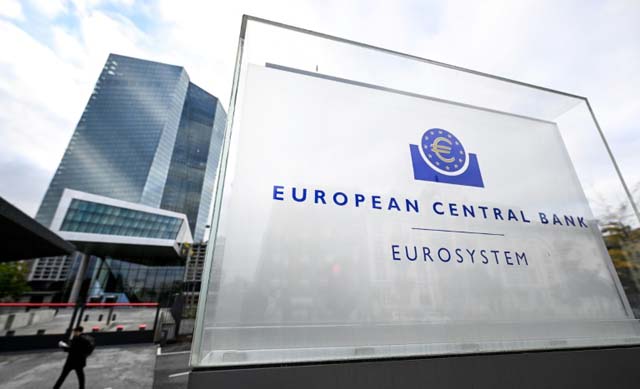
BERLIN, Oct 27, 2023 (BSS/AFP) - The European Central Bank left interest rates unchanged at its meeting on Thursday, bringing an end to a series of hikes that started in July last year.
Policymakers had raised rates at each of their last 10 meetings as they sought to rein in soaring inflation driven in large part by surging energy prices in the wake of Russia's invasion of Ukraine.
But ebbing price pressures and signs of weakness in the economy prompted the ECB to hold interest rates at their current levels, while the bank assesses the outlook for the eurozone.
The decision not to hike again still left the ECB's key deposit rate at four percent -- its highest mark in the history of the central bank.
Eurozone inflation had "dropped markedly", the ECB said in a statement.
Having hit double-digit highs at the end of last year, the annual rate of increase in prices sat at 4.3 percent in September.
The figure was still more than twice the bank's two-percent target, while inflation was still expected to stay "too high for too long", the bank noted.
All the same, the eurozone economy appeared "weak", ECB President Christine Lagarde said after the meeting held exceptionally in Athens instead of Frankfurt, where policymakers usually gather.
- Middle East conflict -
The decision to hold interest rates was a "no brainer" for the ECB, according to ING analyst Carsten Brzeski said.
"The economic situation in the eurozone is deteriorating stronger and faster than the ECB had anticipated," he said.
Business activity in the bloc slumped in October, while eurozone banks have been tightening their lending criteria for households and businesses in response to hikes.
The ECB's monetary policy moves were being "transmitted forcefully" into the real economy, pushing down inflation but also dampening demand, the central bank said.
There was still "more to come" when it came to the impact of higher rates on inflation, Lagarde said.
At the same time, risks to economic growth in the eurozone remained "tilted to the downside", Lagarde said, especially if the impact of interest rate hikes proved to be "stronger than expected".
A weaker world economy would also drag on the currency bloc, Lagarde said, alluding to the war in Ukraine and the recent outbreak of the conflict between Israel and Hamas, which has caused turbulence on oil markets.
"We are very attentive to the economic consequences that that could have, whether in terms of direct or indirect impact on energy prices, or the level of confidence," Lagarde said.
- Hold on -
The ECB's long series of hikes has seen borrowing costs rise further and faster than ever before, lifting rates out of negative territory to a record high.
The central bank's guiding principle going forward was that rates would remain "higher for longer", ING's Brzeski said
The commitment to keep rates high was important to bring inflation back to target, Deutsche Bank economist Mark Wall said.
"The question is, how long is sufficiently long?" Wall said.
While inflation has come down, the ECB does not expect it to return to the target of two percent before 2025, according to its most recent projections in September.
Lagarde refused to be drawn on policymakers' plans for interest rates after the meeting.
It was "not the time for forward guidance", Lagarde said, stressing that the bank would be "data dependent".
"The fact that we are holding doesn't mean we will never hike again," Lagarde said.
Conversely, any discussions over potential future cuts to interest rates to relieve the eurozone's ailing economy would be "totally premature", she said.
To bring down inflation the ECB had "to be steady, we have to hold", Lagarde added.